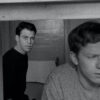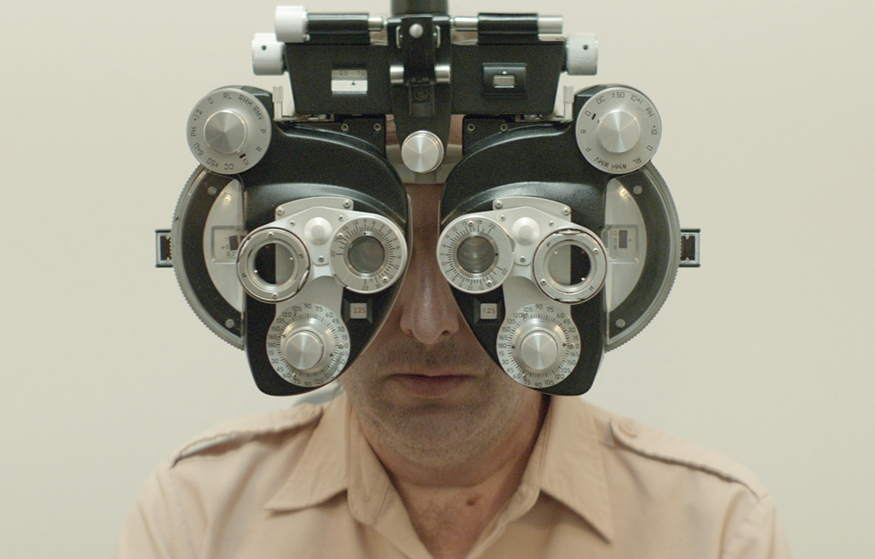Within seconds of talking to Rick Alverson, you know you’re speaking to the person who directed “The Comedy” and “Entertainment,” films with titles that signal how startlingly direct and at the same time elusive they can be. As if heeding the maxim of legendary “Saturday Night Live” writer Michael O’ Donoghue, “Making people laugh is the lowest form of comedy,” Alverson and collaborators Tim Heidecker and Gregg Turkington have done something transcendent in pairing the tropes of languid arthouse cinema with daringly obscure satire.
Whereas their last shared adventure took them through the streets of Brooklyn following a nihilist (Heidecker) leaving a trail of destruction in a hipster-run world in which he sees no truth, “Entertainment” lays waste to the artifice of the medium it’s taking place in, following an unnamed insult comic (Turkington, bearing a strong, suspicious resemblance to his popular “Neil Hamburger” character) wandering around in the sweltering California desert performing material that has passed its expiration date long ago. Both films actively challenge the audience as they unfold, nearly suffocating to watch as their central characters make one self-destructive choice after another that would seem to be a set up for a punchline that never comes. Yet by actually expecting audiences to question what they enjoy and why they do, they arrive as a breath of fresh air.
Alverson never betrays this in discussing the films by allowing even of much as a smile about what he has done, aware of what he’s doing by referring to directing as “troublemaking,” but with the presence of an audience, even this audience of one, he can give thoughtful, thorough answers that still leave you wondering if by taking his work seriously, you’re becoming part of the joke. Regardless, Aversion is an endlessly fascinating person to talk to and shortly before “Entertainment” premieres in Los Angeles as part of the Sundance NEXT Fest in advance of its release in November, he took the time to talk about his ongoing collaboration with Heidecker and Turkington, the invocation of pop culture history in his films, and how he came to make something (slightly) more accessible with his latest.
I see it as an extension of something that was begun with “The Comedy,” but likewise a departure, insofar as that it continues an exploration into a possible American dystopia where dreams, aspirations and recreation are imaginatively taken to their fruition. We watch things collapse psychologically and socially in “The Comedy,” but in “Entertainment” we watch them collapse emotionally.
Gregg and I got to be good friends after his involvement in “The Comedy” and it seems unorthodox to take what he does into the realm of the drama. But with the surreal component, it’s the kind of constructive trouble that he makes in his work, so it seemed to be a perfect fit.
Is it happenstance “The Comedy” takes place in urban Brooklyn and “Entertainment” is out west in the California desert?
Yeah, I was hyperbolically using Brooklyn as a kind of self-described epicenter of culture – a nuclear component in “The Comedy.” I been having this fascination and obsession with this Utopian bent and the American psyche. The idea when it came to “Entertainment” was to use a lot of both cinematic and social cliches as raw materials for something, essentially not really bending to the will of the viewer the way that they’re often used as building blocks for cinema, but [in a way to] watch those stereotypes and those cliches become nuanced and break down.
One of those components was the desert and the still extant idea of the American Expansion and the limitlessness of that Utopian thought. We’re using the stereotype of the odyssey and the desert as a place of renewal and all of the problems associated with those things. Then there was the fact that Gregg has toured through that area a lot, so a lot of these things are bastardizations and riffs on certain experiences that he’s had or that we imagined he might have.

Sure. I think aesthetically, “The Comedy,” no matter how it rubbed me the wrong way, there was an element of it that was working against the certain European or arthouse predilections I might have, right? With this, obviously, it’s in contention with American cinematic history and all the glory and problems associated with that kind of media – this relationship to the structural and aesthetic components of early Hollywood films. There’s a lack of interest in form that exists in contemporary American cinema, largely, even in contemporary American independent cinema, and an emphasis on content. [“Entertainment”] is very much a meditation on form and on the legacy of that form. Antonioni, he’s in there – all of the low-hanging fruit is in there.
Your use of widescreen is particularly striking – it looked like 2.40:1, the widest possible aspect ratio, as well as how you use focus in the frame. How did that particular aesthetic come about?
I hooked up, and very gratefully so, with Lorenzo Hagerman, who shot a movie a couple of years ago called “Heli,” by Amat Escalante, an amazing Mexican director. There’s often times defaults in vernaculars with American cinematographers, and I knew that I wanted to bring in a much more form-oriented approach to the image. Lorenzo and I have become good friends and seem to have all the same interests. We just approached it in that very, very classic way, even stubbornly so. We shot with these Russian LOMO anamorphic lenses from the ’50s that have all kinds of aberrations on them. Any distortions of image or focal issues, these things are all in the lens and I love the textural component of that. That was very important, having to contend with the form rather than just easily view it in a contemporary sense right through to the content. Anamorphic was instrumental in that.

I think what Gregg would tell us is his character Neil Hamburger is, contrary to what the casual audience might initially experience, is highly sophisticated. The on-stage character is virtually the thing we expanded on and riffed [on in “Entertainment”], but we built another, more anonymous character, devoid of attributes or energy off-stage and around that thing. It was necessary that he was ambiguous.
That having been said, we knew there were people who would come and say, “Oh, that stage performance is Neil Hamburger.” That’s not problematic at all. Those folks understand the troublemaking that we’re engaged in. At the same time, it was very important that it wasn’t a prerequisite for watching the film. Frankly, those people [who are unaware of Neil Hamburger] might have a different experience, which is taken into account, and the film can be watched in multiple ways. That’s really important. I tried to take that into account with “Comedy” very much so, too, but it’s difficult. I think I’ve succeeded more with “Entertainment” and making it approachable from a number of different perspectives.
You’re also able to fill “Entertainment” with familiar faces and for instance, when Dean Stockwell comes onscreen for a split-second, you clearly aren’t asking him for his interpretation of a character so much as the history he brings. Is that a big consideration in casting?
I probably overly consider the context and meaning of an individual persona and all that meta material outside of [the role]. In this day and age, it’s ridiculous not to consider the fact that our viewing experience is highly informed by all of the context of the faces and individuals and voices. Forever, cinema has utilized that and tried to exploit those connections, whether it’s celebrity or association or style or trend to market [the films]. I think that this turns that a little bit and it’s playing with the context of each of these faces, to some degree. But there’s also where they fit in in the story. After all, the movie’s called “Entertainment,” so I would hope that people understand that it’s a toxic soup.

Like with anything, being an independent filmmaker, you have to constructively, and hopefully with some ingenuity, deal with smaller budgets. It isn’t just about scraping by with what you can get. It’s about changing the way that your making a movie. My scripts inevitably have certain structural holes, sometimes prior to pre-production, because I need to get and write the locations, so it’s about attentiveness and utilizing what is in the environment. As opposed to complaining about that and trying to manipulate it, you swing with the tide.
Gregg had been to some of these places and the airplane graveyard was someplace that we visited -and it was written into the script – but then as you’re walking through the plan, these things are discoveries that strangely enough become the essential components of the thing. It is that formal and tonal and visual and aural event that is the meaningful experience, much more than the plot.
With the limited amount of locations to be found in the desert, it contributes to a repetition in the film that I imagine was pretty useful for burrowing deeper into the despair that exists in the comedian’s psyche. Was that actually there from the start, or was that something by the necessity you were just referring to that came into the mix?
It’s something I’m interested in in movies, having been a musician in the past and thinking about the power and the necessity of repetition and alteration on theme. Then again, it’s also something that Gregg has experienced as a touring comic. It is all about repetition, the search for variation, so in the content of the film, it’s absolutely necessary to illustrate the experience and have the audience be able participate in that.

That’s my friend Bobby Donne, who I worked with on “New Jerusalem.” He’s a composer working out of Richmond and used to be in a band called Labradford. We’re very close, so it’s very easy. We have fixations with certain horror films and he was a co-writer on “The Comedy.” The genesis of that was he and I conceiving all of these deplorable, horrendous scenarios, and that’s something that we’re interested in textually too, not our needs for recreational purposes, but what it does to the viewer. Everybody involved in the film is interested in the power of discomfort.
If that’s a goal, what’s it been like to see the response to this so far?
I’m thrilled. The idea of provocation is interesting and necessary in all art. But there’s a threshold and it’s a balancing act. I think my becoming interested in these structural components of the mainstream has helped. It’s brought [more] people to the table and [“Entertainment”] is a gentler provocation than “The Comedy” was, so people seem to be receiving it very well. I’m humbled by it.
“Entertainment” will be released in theaters, iTunes and VOD on November 13th. It is playing in Los Angeles at the ACE Hotel on August 8th as part of the Sundance NEXT Fest.






Comments 1